TONIGHT, February 23, the lenten Liturgy of the Presanctified Gifts will be offered at 7:00 p.m. in English and Ukrainian. This is a great way to “get into” spirituality of Great Lent.
Tag: Great Lent
Liturgy of the Presanctified Gifts
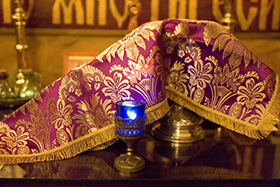 Communing from the Body and Blood of the Master during the period of spiritual combat.
Communing from the Body and Blood of the Master during the period of spiritual combat.
The Liturgy of the Presanctified Gifts is attributed to Saint Gregory the Dialogist (†604), Pope of Rome, but in actuality, it is not the work of one individual, but is a composite work coming down to us from Holy Tradition.
The Liturgy of the Presanctified Gifts, which consists of the Service of Vespers and the Communion of the Faithful with the Holy Gifts. It is commonly celebrated daily in monastic communities, and on Wednesdays and Fridays in parishes, with Holy Bread—that is, the Body of Christ—which has been intincted in the Holy Blood and consecrated at the preceding complete Liturgies on Saturdays or Sundays. The Presanctified or “abridged” Divine Liturgy (since it is affixed to Vespers), is normally celebrated in the late afternoon, when Christians, having fasted until that time, commune, afterwards eating a meal of dry foodstuffs (dried fruits and nuts).
The celebration of the Divine Liturgy, because it is festive and Resurrectional in character, is not allowed during Great Lent and the somber period of the fast, according to ancient tradition and the forty-ninth Canon of the Synod of in Laodiceia [336]. However, from their side, the faithful children of the Church, engaged in the abstemious struggle of the Great Fast and having a clear and particular need for reinforcement by the Holy Mysteries during this period of intensive spiritual combat, desired to commune as often as they could, since Holy Communion was indeed their life and sustenance.
For this reason, so that the faithful not be deprived of the Holy Eucharist on the weekdays of the Great Fast, but that they might be able to commune from the Presanctified Holy Bread [the Body if Christ], the Church, by way of the fifty-first Canon of the Fifth-Sixth [Quinisext] Synod [692], appointed that the Divine Liturgy of the Presanctified Gifts take place on the weekdays of the Great Fast.
Saint Nikodemos the Hagiorite [†1809], in his Rudder, citing the Byzantine canonologist Matthew Blastaris [fl.14th century], reminds us that the faithful resemble wrestlers, and just as wrestlers cease their matches in the afternoon to take nourishment in order to strengthen themselves for the upcoming bout, so the faithful commune from the Body and Blood of the Master during the period of spiritual combat in the Great Fast, that they might be reinvigorated and reinforced by the Lord, thus to continue their match against the passions and the spiritual enmity of the devil with renewed powers and more valorously.
Abbot Tryphon
Thursday of the Second Week
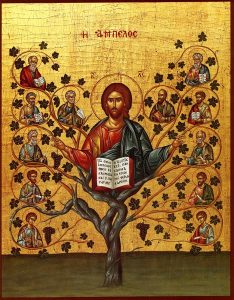 To inspire our prayer today, here are 2 texts from the Liturgy and a reflection on them.
To inspire our prayer today, here are 2 texts from the Liturgy and a reflection on them.
Matins:
This is the season for repentance, the struggle of the Fast. It gains eternal life for us if we stretch out our hands to do good. For nothing is better for the salvation of our souls than to share with the poor; and almsgiving together with fasting free us from death. Let us dearly love this rich treasure which can bring salvation to our souls.
Vespers:
Of old our first parents did not fast from the tree of knowledge according to the command of the Creator, and they received death as the fruit of their disobedience. They were deprived of the tree of life and the sweetness of paradise. Therefore, O faithful, let us fast from perishable food and our deadly passions, so that we might acquire life from the divine tree of the cross, and return with the good thief to our ancient homeland, through the mercy of Christ our God.
Reflection:
The Great Fast is Christ as the way of life. He came that we might have life in abundance, which means fasting “from perishable food and deadly passions.” Adam and Eve ate from the tree of the knowledge of good and evil. Does that mean God does not want us to “know” about good and evil. No, what it means is that we do not define good and evil for ourselves, but only according to God’s commands. The fast often meditates of the tree of life – it is Christ who said, “I am the vine and you are the branches (see the icon). The third Sunday of the Cross gives us access to the tree of life, which is the cross, and the fruit of which is Holy Communion. A second reflection: can we “buy” eternal life? Apparently so, for the price is “to share with the poor, and almsgiving” that frees us from death.
Meditation by Archpriest David Petras
Monday of the Second Week
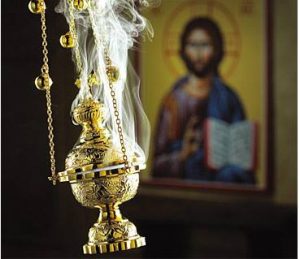 Matins:
Matins: First Sunday of Great Lent – Defense of Holy Icons
![]() “Since the invisible One became visible by taking on flesh, you can fashion the image of Him whom you saw. Since He who has neither body, nor form, nor quantity, nor quality, who goes beyond all grandeur by the excellence of His nature, He, being of divine nature, took on the condition of a slave and reduced Himself to quantity and to quality by clothing Himself in human features. Therefore, paint on wood and present for contemplation Him who desired to become visible.”
“Since the invisible One became visible by taking on flesh, you can fashion the image of Him whom you saw. Since He who has neither body, nor form, nor quantity, nor quality, who goes beyond all grandeur by the excellence of His nature, He, being of divine nature, took on the condition of a slave and reduced Himself to quantity and to quality by clothing Himself in human features. Therefore, paint on wood and present for contemplation Him who desired to become visible.”
St. John of Damascus
On the Divine Images
This Sunday is called the “Sunday of Orthodoxy” because it commemorates the restoration of the Church’s teaching on making images (icons) of our Lord and the saints in the year 843. Before that, it was the Sunday of the Commemoration of the Holy Prophets. This explains the Gospel, Phillip witnesses to Nathanael: “We have found him of whom Moses in the law and also the prophets, wrote – Jesus of Nazareth, the son of Joseph.” This is our goal in the Great Fast – to find our faith in Jesus. The Great Fast was the training period for those about to be baptized, and it was a time for the whole community to rediscover its faith.
Along the journey to Holy Week, we read especially from the book of Genesis and from Isaiah to guide us to Christ, who will perfect his covenant with us by his death and resurrection. This is why, in the Apostolic reading, we remember Moses, Gideon, Barak, Samson, Jephthah, David and Samuel and all the prophets. It was all for Jesus, “Yet all these, though approved because of their faith, did not receive what had been promised. God had foreseen something better for us, so that without us they should not be made perfect. (Hebrews 11:39)” How, then, should we keep the Fast? Hebrews tells us: “since we are surrounded by so great a cloud of witnesses, let us rid ourselves of every burden and sin that clings to us and persevere in running the race that lies before us while keeping our eyes fixed on Jesus, the leader and perfecter of faith” (Hebrews 12:1-2).
The Sunday of Orthodoxy helps us to fulfill this plan, for “keeping our eyes fixed on Jesus,” gazing upon his image, we are led to God, to faith, to life.
Meditation by Archpriest David Petras
Friday of the First Week of the Great Fast
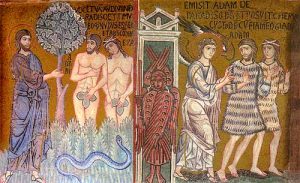 The readings from Genesis on the Fridays of the Great Fast point like an arrow to the covenant made on Good Friday, when our Lord gave his body and blood as a new covenant for the life of the world.
The readings from Genesis on the Fridays of the Great Fast point like an arrow to the covenant made on Good Friday, when our Lord gave his body and blood as a new covenant for the life of the world.
The first and second Fridays tell of the breaking of covenants, of the covenant with Adam and Eve when they ate of the fruit of the tree of the knowledge of good and evil, and of the decision of God to destroy the human race because of its wickedness. The third Friday is the renewal of the covenant with Noah, and the fourth Friday is the covenant with Abraham. On the fifth Friday, Abraham replaces the disobedience of Adam and Eve with obedience to God in the sacrifice of his beloved son. However, God does not want this sacrifice, though he allows his only-begotten Son to die on the cross for the salvation of the human race. The sixth Friday, the funeral of Joseph, looks forward to the burial of Christ, who through his death will trample upon death.
This is our Fast, it is the making of a new covenant with God. When Adam and Eve sinned, they were expelled from paradise, and stationed a cherub with a fiery sword to guard the way to the tree of life. Four curses were imposed on Adam and Eve, on Eve, pain in childbirth, and servitude to her husband, on Adam, hard labor and death.
In the new covenant of our Lord Jesus Christ, the curse is abrogated, as the Kontakion of the Third Sunday of the great Fast proclaims, “No longer does the flaming sword guard the gates of Eden, for the tree of the cross has come to quench it wondrously. The sting of death and the victory of Hades have been driven out.”
The curse is truly abrogated, but in God’s mystical and wondrous way. In childbirth, the woman still suffers pain, but her anguish gives way to joy because of new life (John 16:21), the marital relations between man and woman are now marked by mutual love and respect, in the subtle reading of Ephesians 5:9-19, the harshness of labor is eased by the sabbath rest (Hebrews 4:9). Death remains, and even the Son of God must suffer death (“Christ has redeemed us from the curse of the law, having become a curse for us, for it is written, ‘Cursed is everyone who hands on a tree,” (Galatians 3:10, quoting Deuteronomy 21:23).
In today’s reading, we hear the terrible words which are proclaimed aloud, “By the sweat of your brow you shall eat bread, until you return to the ground, from which you were taken; for you are dust, and to dust you shall return,” but in the serenity of the Great Fast, other words, silently now but soon to be proclaimed, are spoken,“to those in the grave he granted life,” “you will know that I am the Lord, when I open your tombs to lead you, my people, up from their graves (Ezechiel 37:13), and “I am the resurrection and the life. (John 11:25)” God seizes death by the throat, and turns the curse of death into life, for “by death he trampled upon death.”
Meditation by Archpriest David Petras
Wednesday of the First Week
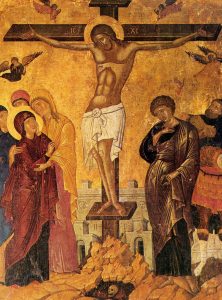 For our prayer today…
For our prayer today…
Matins:
By fasting let us subdue the passions of our mind, and let us put on the wings of the spirit, so that overcoming the tempest raised by the enemy, we may be worthy to adore the Cross of the Son of God. He willed to be sacrificed for the world and we now spiritually keep the feast of his Resurrection from the dead. Let us ascend the mountain with the apostles to glorify the Son of the Father who loves all of us, and to whom all power is now given.
Vespers:
O faithful, while fasting bodily, let us also fast in spirit. Let us loosen every bond of injustice; let us tear apart the strong chains of violence; let us rip up all unjust assertions; let us give bread to the hungry and welcome the poor and homeless to our houses, that we may receive from Christ our God his great mercy.
Reflection:
I listened to this sticheron and was moved deeply in soul. It is a condemnation of me, for the fast really is about justice and charity toward one another. Who, indeed, rises to these challenges? Do we just sing this in our churches without effect? Does it really change our lives. God created a paradise for us and invites us back if only we are not deaf to his words.
Meditation by Archpriest David Petras
Beginning Lent, again…
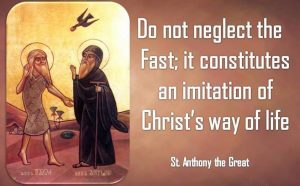 Archpriest David Petras reviews some hallmarks of the liturgical observance and prayer.
Archpriest David Petras reviews some hallmarks of the liturgical observance and prayer.Great Lent approaching
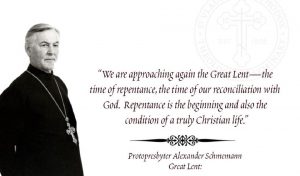
Sunday of the Last Judgment
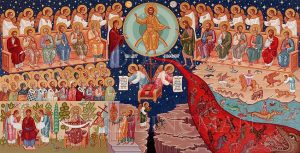 Today, the Church begins her preparations for the Great Fast ( aka, Great Lent).
Today, the Church begins her preparations for the Great Fast ( aka, Great Lent).
In the coming weeks we will delve into what the Great Fast means for us.
Archpriest David Petras writes,
In our preparation for the Great Fast, we must notice a theme emerging. In the parable of the Pharisee and the Tax Collector, the Pharisee was not justified because he failed to see the image of God in the tax collector. (“I thank you that I am not like this tax collector,” Luke 18:11). In the Parable of the Prodigal Son, the older son was not justified because he failed to see the image of God in the prodigal returned home. (“But as soon as this son of yours came, who has devoured your livelihood with harlots, you killed the fatted calf for him,” Luke 15:20).
Today, in the final judgment, the Lord says to the condemned goats, “Assuredly, I say to you, inasmuch as you did not do it (show charitable works of mercy) to one of the least of these, you did not do it to me” (Matthew 25:45). In the popular mind, Lent is a time for self-denial. Stop, that’s it. But why? Because if we do not deny ourselves, we cannot see the image of God in the other, in each and every other human being that he has created.
Possibly the Last Judgment was commemorated on this Sunday, because it is the conclusion of a “Church Year.” Next Sunday, Cheesefare Sunday, we begin again with the story of Adam and Eve and the Fall.
The Great Fast is our journey through the Old Testament, which is concluded with the New Covenant: the Mystical Supper, the Crucifixion and the Glorious and Life-giving Resurrection of our Lord and God and Savior Jesus Christ. We then see through the lens of the Resurrection how God’s plan is fulfilled in Christ in the Gospel of John the Theologian (until Pentecost), in the Gospel of Matthew (from Pentecost to the Exaltation of the Cross), and in the Gospel of Luke (from the Exaltation of the Cross until the Sunday of the Prodigal Son).
Then on this Sunday, we celebrate the last and final and eschatological mystery of the Final Judgment, in which God brings to completion and perfection the whole human story. That may be why, on the day before the Sunday of the Last Judgment, we remember the death of each human being, which is the completion and perfection of our own individual story and our inclusion in God’s ultimate divine plan. Interestingly, the Roman Church read the Gospel of the Final Judgment on the last Sunday before Advent, which began their liturgical year.
Meditation by Archpriest David Petras